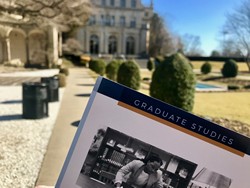For everyone in their undergraduate studies, you may be wondering 1) if you are going to be pursuing graduate school, or 2) what type of graduate school is best for you.
There are a variety of different schools, all ranging from large-scale to small-scale attendance. Other elements may include weather, location, professor to student ratio, and price. In some cases, the graduate school you thought was best for you, may not even have your intended program.
The decision is always tough, and the preparation brings you back to a similar feeling of junior year of high school, when you prepped for undergraduate applications. For those willing to continue their education past a bachelor’s degree, here are some tips, tricks, and recommendations for finding the school best for you.
If you are having trouble finding the type of graduate school that fits your personality, you can always fall back to taking an online personality test that will decide your future. Simply type into the Google search engine: “graduate school personality test,” and click as many links as you wish to see where you were destined to go.
The results are not always going to be reflective of exactly what you need, but they are helpful in allowing you to centralize your focus on what really interests you.
It is key to apply to at least eight schools and those should range from reach schools (low acceptance rates) to “safety” schools.
A tip for applying to graduate school is to look to see the requirements for the program you are interested in. For example, many English programs require proficiency in another language, while others have no language requirement. Always look at the fine print prior to sending in the application.
Start prepping for the graduate exams early. It is beneficial to begin taking the exams at least a year before you plan to graduate. It is crucial to know the required exams for the schools you are applying to. Some will need the GRE or MATs, and some will need specialized exams, too.
On the other hand, some programs may not require standardized testing, but will ask to see a portfolio of your work. Make sure that you are aware of all these requirements, so that nothing is left until the last minute.
Without looking further than needed, conduct some research on Monmouth’s own graduate programs. Our school has over twenty programs (and counting). “Our graduate school works best because, for students already in the undergraduate program, they have already formed close connections with professors in their field,” says Lauren Vento Cifelli, the Associate Vice President of Undergraduate and Graduate Admissions.
Students can easily pick up where they left off and form stronger bonds with the professors they are already comfortable with, making their research better overall.
Cifelli spoke at the recent event “Your Master’s Matters,” which allowed students to meet the deans of each graduate program and learn more details about each subject. They were given an application fee waiver, as well.
Many Monmouth students take advantage of either the standard graduate program, or the five-year bachelor’s/master’s program. Gianna DeSantis, senior psychology student, is planning to start her graduate career at Monmouth.
“Right now,” DeSantis explained, “I’m at Monmouth, so I chose it because I really love it here and I love all my friends, as well as the campus and a lot of the professors.”
While Monmouth is a great option, you do not need to feel pressure to attend the same school. If you find a school outside of Monmouth County, outside of New Jersey, or even outside of the country, then take that opportunity.
But if you feel the pressure of graduate school looming on your shoulders, remember that you have already made the connections and networking needed to have an excellent experience and research here at Monmouth.
Other students may not want to attend grad school, and you should not feel pressure to pursue a higher degree if you do not want to. Christi Ruggiero, senior communication student, feels that grad school is not the best option for her.
“I decided against attending grad school because I was taught that, in the field of communication, hands-on experience is sometimes more valuable than an education program,” Ruggiero said.
Overall, grad school is an important decision, and there is not one right answer to suit everyone. Do your research, reach out to your current professors for guidance, and follow your gut.
PHOTO TAKEN by Jenna Puglisi


